Inspired by the "Popular Education" movement initiated by President Ho Chi Minh in 1945 to eradicate illiteracy and improve people's knowledge, the "Popular Digital Education" movement carries a new mission: Universalizing digital skills, helping all people to access, use and master technology effectively.
As the initiator of the "Digital Literacy for All" movement, General Secretary To Lam, Head of the Central Steering Committee for Science, Technology, Innovation and Digital Transformation, emphasized: "We not only inherit the precious heritage of history, but also need to know how to apply it to current practice. Equipping people with digital knowledge will help them be more confident in the digital environment, proactively seize opportunities and adapt to the development of technology."
The "Digital Literacy for All" movement also aims to implement Resolution No. 57-NQ/TW of the Politburo on breakthroughs in science, technology, innovation and national digital transformation. The movement helps people access and utilize technology in life, form a community that adapts to digital transformation; participate in building a digital government, digital society, digital economy, and digital citizens.
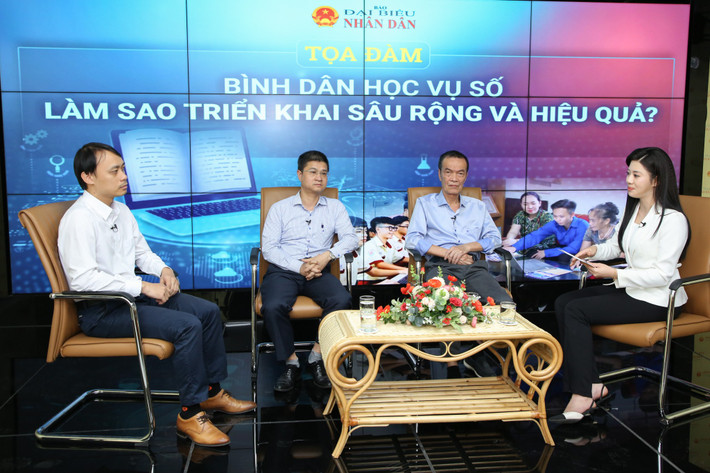
Why is it necessary to urgently implement "Digital Education for All"?
Sharing at the seminar "Digital Popularization - How to implement widely and effectively?" organized by the People's Representative Newspaper, Mr. Nguyen Nhat Quang, Founding Council of VINASA - Vietnam Software and Information Technology Association said that to understand the importance of the "Digital Popularization" movement with the mission of popularizing digital skills, popularizing AI, bringing technology to the masses, we must first look back at history, because this movement was launched, inspired, and inherited from the "Digital Popularization" movement in 1945 initiated by President Ho Chi Minh.
In 1945, 95% of our population was illiterate. On September 2, 1945, Uncle Ho read the Declaration of Independence, giving birth to the Democratic Republic of Vietnam. On September 3, in the first meeting of the Provisional Government, they discussed and approved the 6 most urgent issues raised by President Ho Chi Minh; determining the second task was to "launch a campaign against illiteracy", just after famine. Uncle said: "An ignorant nation is a weak nation".
On September 8, 1945, the Government issued decrees on education, including the establishment of the Department of Popular Education within the Ministry of National Education, stipulating that everyone must strive to eradicate illiteracy, along with eradicating hunger and foreign invaders.
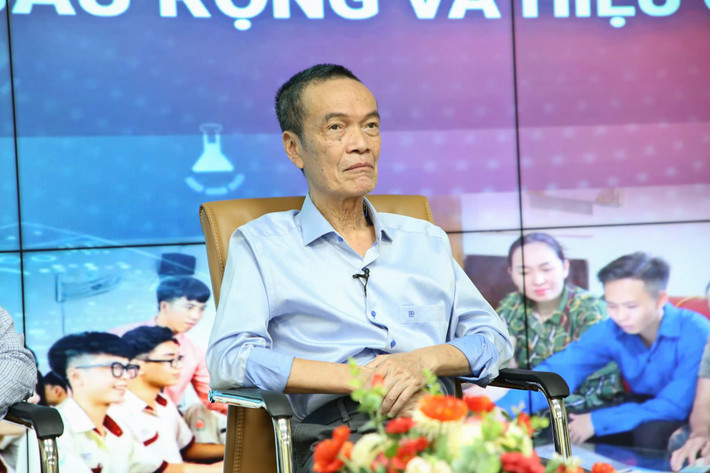
Mr. Nguyen Nhat Quang emphasized that in the present era, we aim to “stand shoulder to shoulder with the world powers”, as Uncle Ho advised. We have escaped poverty, eradicated “hunger” and “ignorance”, so if we want to aim to “stand shoulder to shoulder with the world powers”, the common knowledge and common capacity of the entire population must be different from the past.
The current global context and trend is about digitalization or digital transformation, forming a digital environment. Many activities of the government, businesses, and people are shifting to the digital environment. If people cannot adapt to that digital environment, are not equipped with appropriate digital capacity (including awareness, knowledge, and digital skills) to connect in the digital environment, they will be left behind - this is not in line with our development path. Therefore, it is necessary to urgently deploy digital literacy.
“It can be said that science and technology, innovation and digital transformation are the main methods for our country to develop, achieving the goal of becoming a developed, high-income country with a socialist orientation by 2045. To do this, we are implementing the construction of digital government, digital economy, and digital society. However, if people do not have appropriate digital capacity, they will not be able to participate in building digital government, digital economy, and digital society. Thus, digital transformation will not be successful.
Digital transformation is people-centered, and at the same time, people are identified as the main subjects implementing the digital transformation revolution. Therefore, popularizing knowledge, skills, attitudes and awareness for the whole population about digital technology in general, AI technology and other technologies is extremely urgent and important," said Mr. Nguyen Nhat Quang.
According to Mr. To Hong Nam, Deputy Director of the Department of Science, Technology and Information, Ministry of Education and Training, when we transform digitally, take people as the center and deploy digital government, digital economy, digital society, digital citizens are the decisive factor.
“No matter how well-designed or user-friendly a system is, if people do not know how to use it or do not use all its functions, it will be a real waste,” Mr. To Hong Nam emphasized.
The Deputy Director of the Department of Science, Technology and Information, Ministry of Education and Training also said that currently, all activities of people in the real world are implemented similarly in the digital world, and even the interactions in the digital world are greater. In the digital space, if people do not have digital skills, they cannot work, cannot work, and cannot even entertain.
Therefore, the issue of each citizen having digital capacity is extremely necessary, especially in the current period, when we implement Resolution No. 57-NQ/TW dated December 22, 2024 of the Politburo on breakthroughs in science, technology development, innovation and national digital transformation.
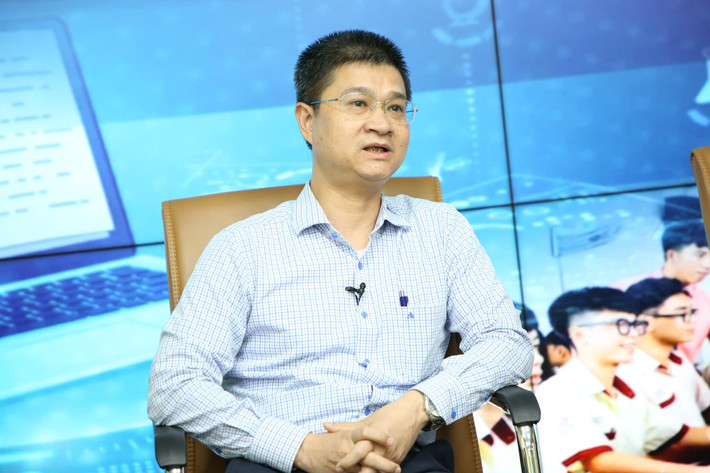
In-depth, scientific research is needed to assess the learning needs of each subject.
Associate Professor Dr. Ha Minh Hoang, Head of the Department of Data Science and Artificial Intelligence, School of Technology, National Economics University, said that in order to organize the "Digital Education for All" movement effectively and with quality, it is necessary to change the teaching mindset of teachers and training program designers. Because when implementing the "Digital Education for All" movement, it means teaching ordinary people knowledge that is relatively difficult to learn, on the basis of relatively rapid changes in technology.
According to Associate Professor Dr. Ha Minh Hoang, when designing or organizing courses in "Digital Popular Education", it is necessary to ensure 3 factors.
The first is usefulness. It is necessary to instruct people in “close-to-the-eye” skills that they can use every day, thereby helping them have greater motivation and need to learn. These include skills such as: using public services, information security, skills to avoid technology fraud, etc.
Second , make it easy for people to access. In terms of content, the lectures must not be too difficult; the lectures can be divided into modules, each module focuses on a specific issue, and takes only 10-15 minutes to study every day, anywhere. This helps learners gradually absorb digital skills naturally. In addition, it is necessary to convey knowledge based on multimedia platforms, which can be on online training courses, massive open online courses (MOOCs), popular classes or learning on mass media, newspapers, Youtube, Tiktok, etc. to get closest to the people.
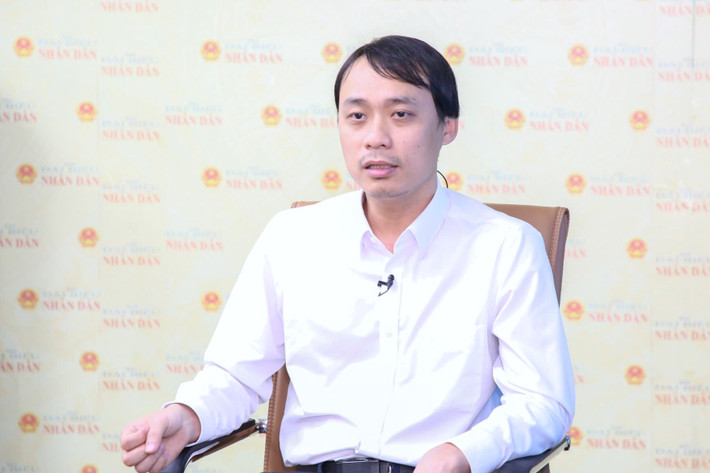
Third, the program must be flexible, especially in terms of content, because technology changes every day. The program must be designed to be flexible with changes in technology and the needs of technology users.
“In my opinion, these are three important factors to guide and help the “Digital Education for All” movement truly enter people’s lives,” Associate Professor, Dr. Ha Minh Hoang emphasized.
Associate Professor Dr. Ha Minh Hoang also acknowledged that in order for the movement to be widely and effectively implemented, it is necessary to mobilize resources from the whole society and allocate them effectively. He proposed that there should be in-depth, scientific, and systematic research to assess the need for learning digital skills in society, for each subject. Because each subject will have different needs, there should be different lectures and evaluation methods.
The movement to be sustainable must gradually shift to building a learning society.
Mr. Nguyen Nhat Quang, VINASA Founding Council, acknowledged that with the current “Digital Education for All” movement in Vietnam, many places have deployed community digital transformation teams, based on youth unions, students, and university students teaching the community; in each family, children teach their parents and grandparents. This is also a very good initiative, because young people often access digital technology faster.
In fact, there were many initiatives implemented even before we officially launched the “Digital Popular Education” movement. Now that the Party has launched the movement, it is necessary to systematize and deploy it on a larger scale, expanding from local initiatives to become a national movement, and all regions must have “Digital Popular Education”.
“In the past, people created different, quite popular and easy-to-understand ways to learn letters, such as: "o" is round like a chicken egg, "o" wears a hat, "o" has a beard. Nowadays, when applying "Popular Digital Education", I think that if we invite a professor to teach digital skills to people in remote areas, sometimes they may find it difficult to understand. But by people teaching people, those who have learned a little bit teaching those who have not, people will create many forms to teach each other about digital skills", Mr. Nguyen Nhat Quang shared.
He also believes that digital capacity itself must be continuously updated, so if the "Digital Literacy for All" movement wants to achieve sustainability and truly become a driving force for the country's socio-economic development, it must gradually transform into building a learning society in general. This means that people must be aware of continuous learning instead of learning and knowing a certain amount of knowledge and that's it; or that socio-political organizations and governments, when they have completed certain targets, have completed their tasks.
“The “Digital Literacy for All” movement must be a continuous process, becoming a culture of continuous learning, a learning society. The culture of lifelong learning must permeate every citizen, transforming from an initial movement into a culture. In my opinion, this is a huge challenge,” said Mr. Nguyen Nhat Quang.
To ensure comprehensiveness in implementing the “Digital Literacy for All” movement, Mr. To Hong Nam, Deputy Director of the Department of Science, Technology and Information, Ministry of Education and Training, said that first of all, it is necessary to raise awareness. Every citizen, every student, and every teacher must realize that equipping digital capacity is for themselves, which leads to the action of equipping digital skills.
Then, consider what is needed to implement. Everyone needs the internet, needs computers, needs smart devices. According to Mr. Nam, the important solution now is to prioritize state budget resources, prioritize socialization to equip people with necessary equipment and cover all regions.
However, Mr. Nam also emphasized that even if there is equipment and internet signal but people do not know how to use it, it is worthless. "Therefore, we must have a solution so that even the most ordinary people know how to use it," he said.
According to the Deputy Director of the Department of Science, Technology and Information, in order for people to access and learn digital knowledge and skills, there needs to be solutions to support people in self-study. For those who have difficulty in self-study, such as the elderly, support is needed.
“We need a system of documents, lectures and instructions to help people learn on their own. Self-study now does not mean holding a book anymore, but can use digital platforms to learn anytime, anywhere. For those who cannot learn on their own, based on those documents, through mentors (supporters), each person, each student, and each teacher can learn. Mentors will be approved by sectors, organizations, as well as local authorities,” Mr. To Hong Nam proposed.
He emphasized that the key is to have the participation of the entire system, not just the education and information and communication sectors. We need the participation of all levels of government, organizations and other sectors to create a combined strength, synchronous, unified and comprehensive implementation.
Source: https://daibieunhandan.vn/xay-dung-phong-trao-binh-dan-hoc-vu-so-phai-la-qua-trinh-lien-tuc-de-tro-thanh-van-hoa-hoc-tap-suot-doi-post410657.html



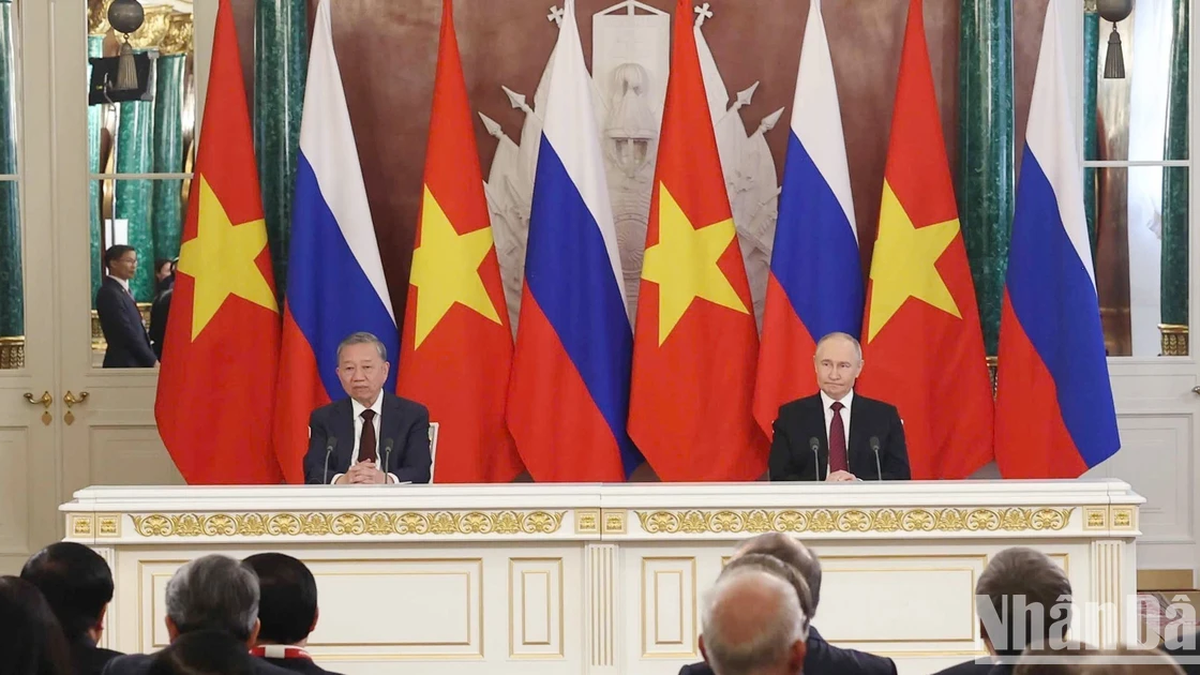


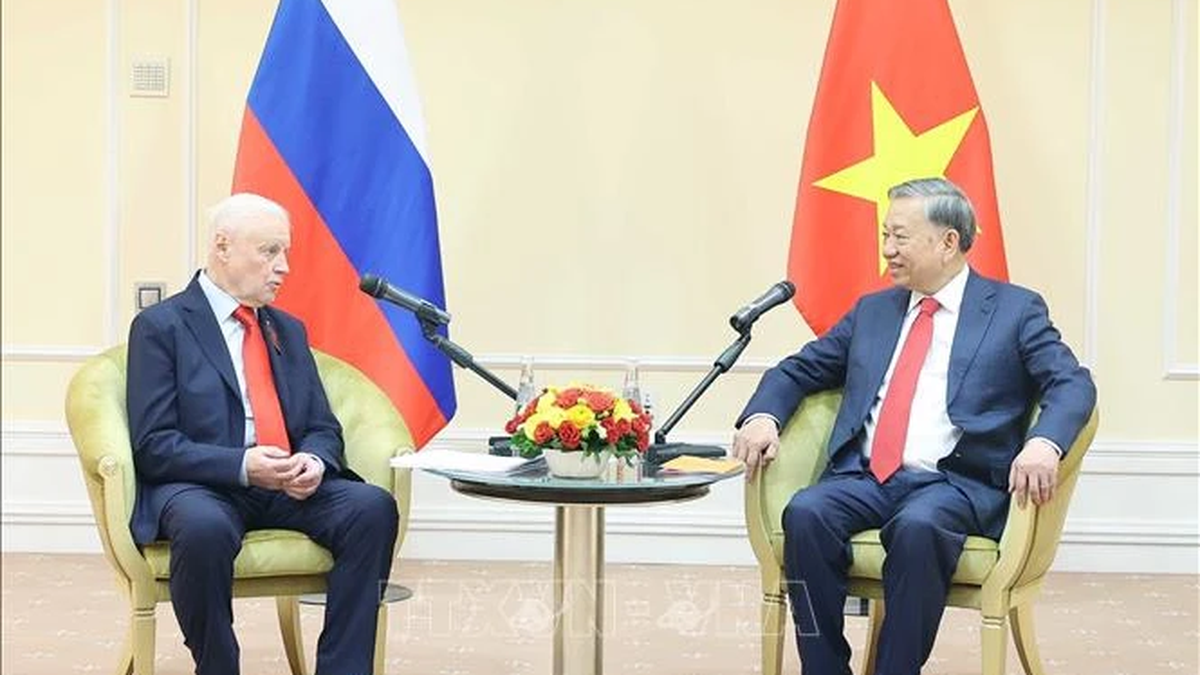
![[Photo] Prime Minister Pham Minh Chinh chairs Government Standing Committee meeting on Gia Binh airport project](https://vphoto.vietnam.vn/thumb/1200x675/vietnam/resource/IMAGE/2025/5/10/6d3bef55258d417b9bca53fbefd4aeee)


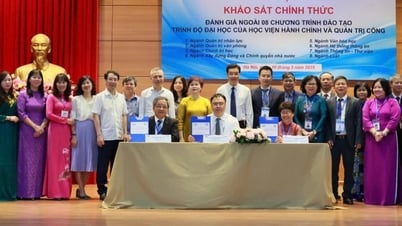
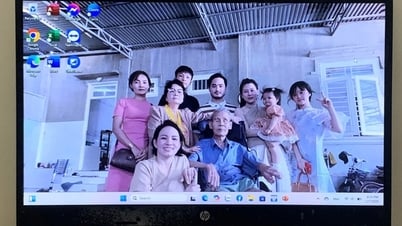











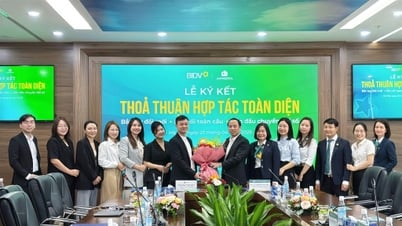

































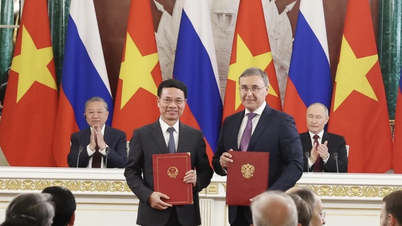
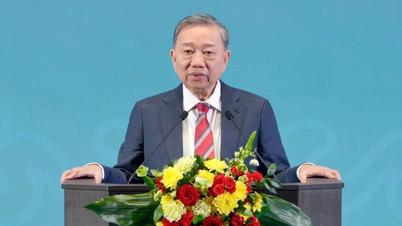

































Comment (0)